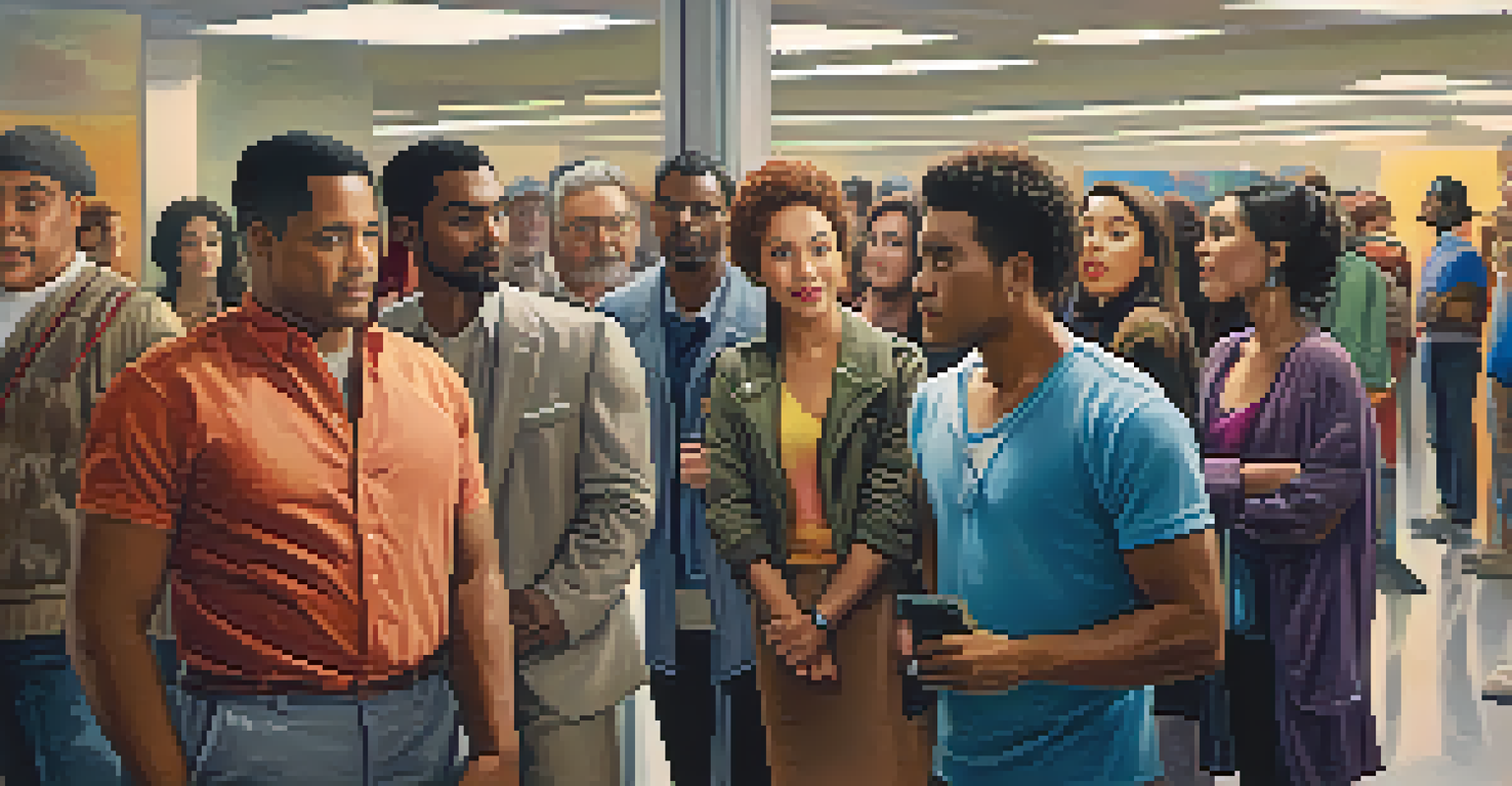The Role of Casting in Film: Selecting the Right Actors

Understanding the Importance of Casting in Film
Casting is one of the most critical stages in film production, as it sets the tone and direction of the entire project. The right actors bring characters to life, making them relatable and engaging for the audience. Without a solid casting choice, even the best-written scripts can fall flat, failing to resonate with viewers.
Casting is the most important part of filmmaking. It’s where the magic begins.
Imagine watching a dramatic scene where an actor's performance feels forced or unnatural; it quickly pulls you out of the story. Conversely, a well-cast actor can evoke emotions and create a connection that keeps audiences invested. This vital aspect of filmmaking not only impacts the story but also influences how the film is received by critics and fans alike.
Moreover, casting decisions can also affect the marketing and distribution of the film. Star power often attracts attention, making it easier to promote the film. Therefore, understanding the importance of casting is essential for anyone involved in film production.
The Casting Process: From Auditions to Final Choices
The casting process is often a lengthy and intricate journey that begins with auditions. Casting directors sift through countless actors, holding auditions that can range from cold readings to chemistry tests with other potential cast members. This allows them to gauge not only the individual actor's talent but also how well they fit into the ensemble.

Once auditions are complete, casting directors must make tough decisions, often considering various factors such as the actor's previous work, their fit for the character, and even their marketability. This is where the art of casting truly shines, as directors must balance the emotional and financial aspects of their choices. It's like putting together a puzzle where each piece must fit perfectly to create a cohesive picture.
Casting Shapes Film Success
Effective casting is crucial as it brings characters to life, significantly impacting audience engagement and film reception.
After narrowing down the options, the final choices are usually presented to the director and producers for approval. This collaborative decision-making process ensures that everyone involved feels confident about the cast, ultimately leading to a stronger film.
The Impact of Chemistry Between Actors
Chemistry between actors can make or break a film, as it significantly influences the believability of their relationships on screen. When actors share a natural connection, their performances become more authentic, allowing viewers to immerse themselves in the story. Think of iconic film duos; their chemistry often becomes a defining feature of the movie.
The best performances come from actors who truly resonate with their characters.
Casting directors often conduct chemistry tests to assess how well actors interact with one another. This step helps ensure that the chosen actors can convincingly portray their characters' dynamics, whether they're lovers, friends, or adversaries. A lack of chemistry can leave audiences feeling disconnected, while strong chemistry can elevate a film from good to unforgettable.
Ultimately, casting with chemistry in mind is about creating magic on screen. When actors connect, it amplifies emotions, making the narrative more gripping and relatable.
Character Archetypes and Casting Choices
Every story features character archetypes – like the hero, the mentor, or the villain – that serve as the backbone of the narrative. Selecting the right actors to embody these archetypes is crucial, as it shapes the audience's perception of the story. For example, a charismatic actor might be the perfect fit for a charming hero, while a more intense performer could excel as a complex antagonist.
Casting directors often look for actors who can not only portray these archetypes convincingly but also bring their unique flair to the role. This balance of familiarity and originality keeps audiences engaged, making the characters feel fresh, even if they follow traditional tropes. It’s like cooking; using familiar ingredients in innovative ways can create a delightful dish.
Chemistry Elevates Performances
Natural chemistry between actors enhances authenticity, making relationships on screen believable and captivating for viewers.
Understanding character archetypes and how they relate to casting choices helps filmmakers create memorable stories. When the right actor aligns with their archetype, it enhances the film's overall impact, making it resonate with viewers long after the credits roll.
The Role of Diversity in Casting
In recent years, the importance of diversity in casting has become increasingly recognized in the film industry. Diverse casting not only reflects the world we live in but also enriches storytelling by bringing different perspectives and experiences to the forefront. This inclusivity allows for a broader range of narratives, making films more relatable to diverse audiences.
Filmmakers are now more aware of the impact that representation has on viewers. When audiences see themselves reflected on screen, it fosters a sense of belonging and connection. This shift in casting practices encourages young actors from various backgrounds to pursue their dreams, knowing they have a place in the industry.
Ultimately, casting diverse actors not only enhances the authenticity of the film but also promotes social progress. By embracing diversity, filmmakers can create stories that resonate on multiple levels and inspire change in society.
The Influence of Star Power in Casting Decisions
Star power can significantly influence casting decisions, as well-known actors often bring an established fan base and instant recognition. This can be a double-edged sword; while it may boost box office numbers, it can also overshadow lesser-known talent who might be more suited for the role. It's essential for filmmakers to strike a balance between star appeal and the actor's ability to embody the character authentically.
Casting a star can also impact the film's marketing strategy, as their presence often attracts media attention and promotional opportunities. However, relying solely on star power can lead to a lack of depth in storytelling if the actor isn’t the right fit. This highlights the importance of prioritizing the character's needs over simply casting a recognizable name.
Diversity Enriches Storytelling
Incorporating diverse casting reflects society and broadens narratives, fostering connection and representation for varied audiences.
Ultimately, while star power plays a role in casting, it should not come at the expense of the film's integrity. The best performances come from actors who truly resonate with their characters, regardless of their fame.
Casting Directors: The Unsung Heroes of Film
Casting directors are often the unsung heroes of film production, working tirelessly behind the scenes to find the perfect talent for each role. Their expertise in recognizing potential and matching actors with characters is invaluable. Without their keen eye and understanding of the industry, many films would struggle to find the right cast.
These professionals not only conduct auditions but also build relationships with actors, agents, and producers. This network enables them to scout talent effectively and stay updated on emerging actors. Think of them as talent matchmakers, ensuring that each actor they select is a great fit for the film's vision.

Casting directors play a crucial role in shaping the film's final product. Their decisions influence the overall quality of the film, proving that their work is just as important as that of directors and writers in creating a compelling story.